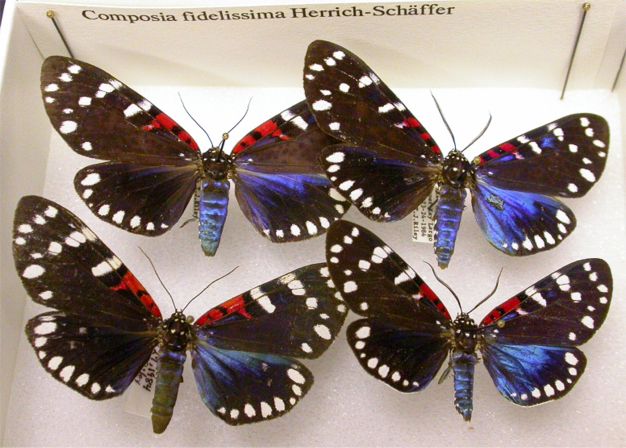 |
Blue iridescence on hindwings & abdomen is a structural color
Return to Texas Entomology - Compiled by Mike Quinn
 |
Blue iridescence on hindwings & abdomen is a structural color
Range: U.S. range per Kimball (1965):
The species is relatively common in the Keys and is taken frequently in the Miami-Paradise Key region. North of Miami it is very rare, most of these records dating before the freeze of 1899.
Throughout the Antilles per Holland (1903).
Flight Period: Year round
Host Plants:
Devil's Potato - Echites umbellata - Apocynaceae - Info
Oleander - Nerium oleander - Apocynaceae - Info
Leafless Swallowwart - Cynanchum scoparium - Apocynaceae s. l. ("Asclepiadaceae") - Info
Baybean - Canavalia rosea - Fabaceae - Info
Type Locality: Cuba
Note: Images of the larva and adult of this species grace the covers of Wagner (2005) and Kimball (1965) respectively.
Similar Species:
Composia credula (Fabricius, 1775)
Composia utowana Bates, 1933Texas Pericopini:
Dysschema howardi (Hy. Edwards, 1886)
Dysschema leucophaea (Walker, 1854)
Gnophaela aequinoctialis (Walker, 1854)
Phaloesia saucia Walker, 1854
Photos: Adult, Pupa, Larva, Ova - by the incomparable Alan Chin-Lee
Stamps:
1977 Cayman Islands Butterflies and Moths. First Day Cover issued 2 December 1977
Larger images of same stamps
Biography: Gottlieb August Wilhelm Herrich-Schäffer - Wikipedia
Etymology: fide, -l, -n (L). Faithful, trusting
References:
Bates, M. 1933. The pericopid genus Composia (Lepidoptera). Psyche 40: 121-124.
Borror, D.J. 1960. Dictionary of Word Roots and Combining Forms. National Press Books, Palo Alto. v + 134 pp.
Covell, Jr., C.V. 1984, 2005. Field Guide to Moths of Eastern North America. Virginia Museum of Natural History, Martinsville, VA. xv + 495 pp, 64 plates.
Forbes, W.T.M. 1930. Insects of Porto Rico and the Virgin Islands. Heterocera or moths (excepting the Noctuidae, Geometridae and Pyralidae). Scientific Survey of Porto Rico and the Virgin Islands 12:1-171, 2 plates.
Gundlach, J. 1881. Contribución á la Entomología Cubana. Havana. xxi + 445 pp.
Herrich-Schäffer, G.A.W. 1866. Schmetterlinge aus Cuba. Correspondenz-Blatt des zoologisch-mineralogischen Vereines in Regensburg 20: 130-136.
Holland, W.J. 1903. The Moth Book. Doubleday, Page & Co., New York. 479 pp.
Kimball, C.P. 1965. The Lepidoptera of Florida; an annotated checklist. Arthropods of Florida and Neighboring Land Areas, Vol. 1. Florida Department of Agriculture and Consumer Services, Division of Plant Industry. v + 363 pp.
Wagner, D.L. 2005. Caterpillars of Eastern North America: A Guide to Identification and Natural History. Princeton University Press, Princeton, NJ. 496 pp., 1,200+ color photos.
Watson, A. & D. T. Goodger. 1986. Catalogue of the Neotropical Tiger Moths. Occasional papers on Systematic Entomology of the British Museum (Natural History), 1: 1-71.
03 Jun 2007 © Mike Quinn / mike.quinn@tpwd.state.tx.us / Texas Entomology / Texas Lep Information / Diurnal Moths